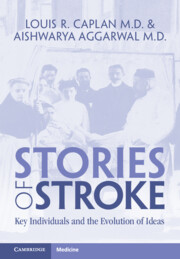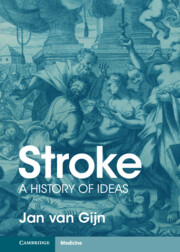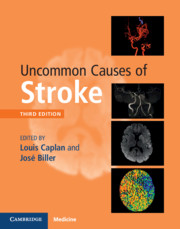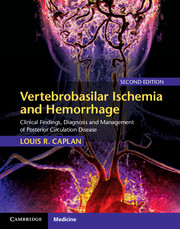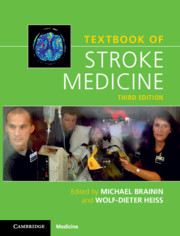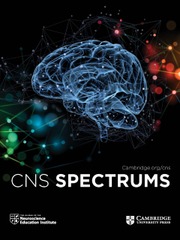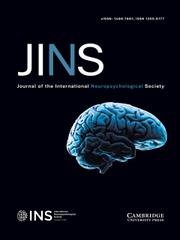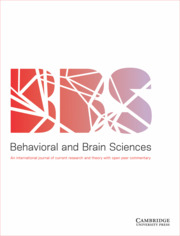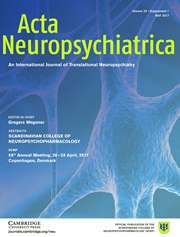Stories of Stroke
Key Individuals and the Evolution of Ideas
£80.00
- Authors:
- Louis R. Caplan, Beth Israel Deaconess Medical Centre
- Aishwarya Aggarwal, John F. Kennedy Medical Center
- Date Published: December 2022
- availability: In stock
- format: Hardback
- isbn: 9781316516676
£
80.00
Hardback
Other available formats:
eBook
Looking for an inspection copy?
This title is not currently available on inspection
-
Stroke is one of the most important and most feared conditions known to man. The threat of stroke is important to all people. What could be more devastating than to lose the ability to speak, move a limb, stand, talk, see, read, feel write or even think? This book brings together ideas, events and advances – the stories – before and during the 20th Century through the accounts of global experts in the field, many of them having been first-hand witnesses to progress. Focusing on selected stories of stroke, this book offers a readable summary of the most dramatic and extensive changes in knowledge about stroke and in caring for stroke patients. Of interest to anyone interested in neurosciences and for physicians caring for stroke patients, this book informs on moving forward, by looking to how we got to where we are.
Read more- Provides a readable digest of the important developments in the care of stroke patients throughout the 20th Century to the present day
- Written by international leaders in the field of stroke, telling their often contemporary tales of ideas, events and advances that have shaped our current understanding and treatment of stroke
- Focuses on key individuals who were innovators, movers and shakers who moved the field along, emphasizing ideas and how they have evolved to now
Reviews & endorsements
'This impressive and hefty book provides an excellent overview of stroke history in its entirety. It includes easily readable and referenced articles on topics most relevant to modern stroke care, lending important historical context that frames just how far the stroke field has progressed in the last 50 years.' Madeline Russell, Doody's Reviews
Customer reviews
Not yet reviewed
Be the first to review
Review was not posted due to profanity
×Product details
- Date Published: December 2022
- format: Hardback
- isbn: 9781316516676
- length: 670 pages
- dimensions: 260 x 182 x 36 mm
- weight: 1.5kg
- availability: In stock
Table of Contents
Why this book needed to be written
Part I. Early recognition:
1. Hippocrates and early Greek medical practice
2. Early Greco-Roman contributions
3. Islamic and middle east contributions
Part II. Basic knowledge:
16th to early twentieth centuries. Anatomy, Physiology, and Pathology:
4. Andreas Vesalius
5. William Harvey. On the motion of the heart and blood
6. Thomas Willis. Anatomy of the brain and its vasculature
7. Giovanni Morgagni: emphasis on Pathology
8. Apoplexy. Ideas and concepts, 17-20th century
9. Atlases
10. Brainstem syndromes
11. Jules Dejerine
12. Arterial and Venous anatomy
13. Rudolf Virchow
14. Early medical and neurological textbooks
Part III. Modern era mid twentieth century to the present: A: Types of Stroke
15. Carotid Artery disease
16. Lacunes
17. Vertebrobasilar disease
18. Aneurysms and subarachnoid hemorrhage
19. Intracerebral Hemorrhage (ICH)
20. Vascular malformations
21. Venous and dural sinus thrombosis
22. Arterial dissections, Fibromuscular Dysplasia (FMD), MoyaMoya disease, and Reversible Cerebral Vasoconstriction Syndrome (RCVS)
23. Blood Disorders
24. Stroke Genetics
25. Eye vascular disease
26. Spinal cord vascular disease
27. Charles foix
28. Houston Merritt and Charles Aring
29. C Miller Fisher
30. Louis Caplan
31. Cerebral angiography
32. Computed Tomography (CT)
33. Magnetic Resonance Imaging (MRI)
34. Cerebrovascular ultrasound
35. Cerebral blood flow, radionuclides, and Positron Emission Tomography (PET)
36. Cardiac imaging and function
37. Stroke-related Terms
38. Epidemiology and risk factors
39. Data Banks and registries
40. Pediatric stroke
41. Care of stroke patients
42. Neurocritical care
43. Clinical stroke trials
44. Heparin
45. Warfarin
46. New oral anticoagulants/direct oral anticoagulants
47. Aspirin
48. Other antiplatelets
49. Other medical treatments
50. Neuroprotection
51. Thrombolysis
52. Treatment of cerebral venous thrombosis
53. Recovery and rehabilitation
54. Carotid artery surgery
55. Angioplasty and stenting
56. Endovascular treatment of acute ischemic stroke
57. Brain aneurysm treatment/treatment of aneurysms and subarachnoid hemorrhage
58. Medical and surgical treatments of intracerebral hemorrhage
59. Treatment of vascular malformations
Part IV. Stroke literature, organizations and patients:
60. Stroke organizations, journals and books
61. Famous stroke patients/prominent stroke patients.
Sorry, this resource is locked
Please register or sign in to request access. If you are having problems accessing these resources please email [email protected]
Register Sign in» Proceed
You are now leaving the Cambridge University Press website. Your eBook purchase and download will be completed by our partner www.ebooks.com. Please see the permission section of the www.ebooks.com catalogue page for details of the print & copy limits on our eBooks.
Continue ×Are you sure you want to delete your account?
This cannot be undone.
Thank you for your feedback which will help us improve our service.
If you requested a response, we will make sure to get back to you shortly.
×
